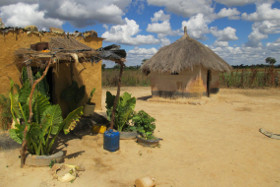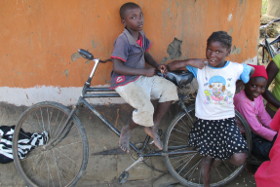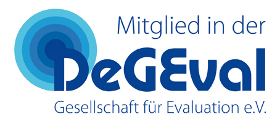References
Ex post evaluation of the Integrated Water Resource Management Project in Yemen for BGR
Yemen, 05/2016-07/2016
Ex post evaluation of the Integrated Water Resource Management Project (Phase III) in the Republic of Yemen for the BGR (Federal Institute for Geosciences and Natural Resources). This final evaluation was implemented due to the war and crisis remote. Classic instruments like online questionnaire, telephone and skype interviews, personal interviews in BGR and document studies were applied.
Final evaluation of the climate change adaptation project in Lake Chad Basin / GIZ
Chad, 02/2018-07/2018
Final evaluation of Modul 2 of the Adaptation to climate change in Lake Chad Basin (GIZ) applying the new (Verfahrensreform) of GIZ. The competences and the ability of lake Chad Commission is strengthened that the Committee can fulfil the tasks. Small holding farmers in the Lake Chad region are trained to apply climate sound agriculture.
Assessment of potential synergies between the Agricultural Technical Vocational Education and Training (ATVET) and the Agricultural Advisory Service (AAS) in African countries.
In four countries (Ghana, Kenya, Ethiopie and Nigeria) a survey was conducted to identify existing linkages and what is needed to expand them. An online questionnaire for different stakeholders of the process in these countries and three short case studies were deloped to highlight the different situations in different countries.
Functional analysis of two Departments in the Kyrgyz Agricultural Administration to improve the managsement and the monitoring of the pasture in the country of the Kyrgyz Republic.
A survey and a proposal was made to collect the different positions and proposals of the involved stakehoder. The existing functiuons of the Pasture Department and the Rayon Department of Agricultural Development wer analyzed and with regard to the necessary tasks in the country improved (Ministry of Agriculture and Melioration, Kyrgyz Republic, GIZ).
Development and identification of sources of income for the small scale farmer and livestock keeping households in South Sudan to improve the income situation of the rural poor.
In a participative approach severeal small scale projects (bee keeping, animal traction ox ploughing, production of gum arabicum...) were identified and proposed for training activities fort he farmers and livestock keepers in the project region GPAA (Greater Pibor Administrative Region) in South Sudan (GIZ).
Support of the Federal Ministry for Environment, Building and Nuclear Safety and the German Agency for International Cooperation (GIZ) in their task to identify the most valuable und relevant projects to be funded by the international climate initiative (
The assessment of the project proposals align certain pre defined evaluation questions regarding the relevance and the expected contribution of the projects to the objectives of the international climate initiative.
Evaluation of the project "Propagation of biological agriculture and income generation for small holding rural households in Zambia and Zimbabwe".
After around 70 % runtime of the project an evaluation of its implementation in the two pilot areas (Chibombo and Chisama district) in the Kabwe region in Central Zambia had to be undertaken. The target group - small holding farming households - which belongs to the poorest was visited and questioned in Mini Workshops and Focus Groups. Practical interventions like bee keeping and small livestock was observed while visiting the farms of the target groups. Zambian agricultural administration like extension service and representatives of the political administration was queried for their view onto the project. The project staff and the staff of the headquarter of Environment Africa in Harare, Zimbabwe, was questioned as well. The evaluation was conducted by Konsortium in collaboration with a local Zambian Consultant.
Position paper of the Physikalisch Technische Bundesanstalt / PTB to their contribution to Rural Development and the agricultural Value Chain approach
The new focus of Development Cooperation Rural development and Value Chain approach has also specific contribution by the PTB and its portfolio of Quality Infrastructure. The description and specification of this contribution needed to be clarified in a position paper for the BMZ. The draft of this paper was elaborated by Konsortium and was the start up for further discussion in the PTB and its staff.
Evaluation of the website Qantara.de (German Ministry of Foreign Affairs)
After 9/11 the German Government installed the project „Website Qantara.de“ (arabic = bridge) which is implemented by the institutions Deutsche Welle, Goethe-Institute, Institut für Auslandsbeziehungen and Bundeszentrale für politische Bildung in Germany. This project intends to be a bridge to the islamic and arabic world with the objectives to provide a dialog strategy instead of confrontation, enhance the dialogue between the cultures and to reduce prejudices. A team of three consultants of konsortium evaluated the management of the project, the achievement of the objectives, the perception of the project in target countries and the user statistic of this site. Personal searches in Morocco and Jordan and further inquiries took place.
Evaluation of the undjetzt!?-Conference 2013 in Tonndorf near Weimar (Germany)
The conference from 29. Aug. to Sept. 5 hosts 130 young German volunteers who spent several months in a project abroad in a country of the south or east (so called developing country). In the conference the young people exchange and reflect their experiences during this time in a foreign country and culture. In workshops, lectures, open space and work groups new ideas of a sustainable, environmental friendly and satisfied life is discussed an new approaches shared. The meeting took place on the Castle Tonndorf which is the home of a community of 30 adults and 35 children.






